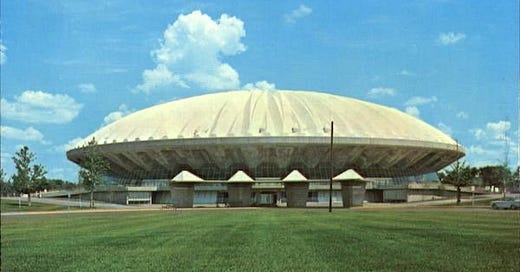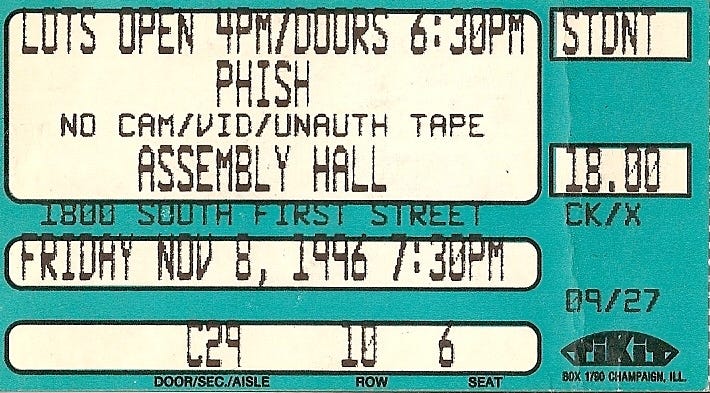SET 1: Runaway Jim, Axilla > All Things Reconsidered > Mound, Down with Disease > Prince Caspian, Reba, Golgi Apparatus, Run Like an Antelope
SET 2: Also Sprach Zarathustra > Maze, Bouncing Around the Room > Simple, Loving Cup, Mike's Song, The Star Spangled Banner, Weekapaug Groove
ENCORE: Theme From the Bottom
If you believe in omens, portents, prophecies, and oracular visions, 11/8/96 is a full night. The band’s second visit to the concrete flying saucer of Champaign-Urbana falls between more highly-regarded stops in 1995 and 1997, though it’s still a very solid show, with excellent versions of Reba, Maze, Simple, and Mike’s. But there’s also an undercurrent of unease provided by a rare occurrence for Phish shows: the recurrence of technical difficulties. Corn gremlins, is that a thing?
The first symbolic action of the night is intentionally taken by the band. For the first time since October 1994 (170 shows), and really the first time since August 1993, the original lyrics of Axilla come back from their Hoist-related banishment. The story of Axilla I and Axilla II is one of my favorite allegories for Phish’s unease with mainstream success. In an attempt to sand away their weirder edges in the hope of radio play, Phish decided to rewrite the words of Axilla from piano witches, furry thugs, and prostatic reams to a bland meditation on sitting by the pool, wishing it were cool. But, perversely, they didn’t change the hook of the chorus from a rousing chant of the medical/Latin term for…the armpit.
Phish used the remodeled version of the song throughout 1994 and 1995 (apart from that random 10/16/94 performance), then retired it after NYE 95 until 2021 at Shoreline. The reclamation of the original lyrics in Champaign feels like the final nail in the coffin of the Hoist plan for a commercial crossover. Phish has officially “made it” without compromise, so time to go back to the old, weird, better version of themselves.
Sounds simple, and yet Trey’s equipment has something to say about that. Twenty seconds into Axilla, a weird intermittent buzzing arises, growing problematic enough that Page has to take over singing the revived lyrics for part of the second verse (props to Page for knowing words they had only sung once in the last 3 years!). During a guitar outage that only lasts 30 seconds but feels much longer, Trey kicks his rig in anger, prompting an angry electric jolt before he hops right back onto the Axilla riff.
There are many amazing things about Phish, but one of the most taken for granted is the invisibility of their technical operation. Think about how few times we’ve seen Trey tune, or switch to another guitar, how rare it is for a crew member to have to come onstage and make an adjustment during a set. Sure, there have been a few high-profile mishaps lately, but only on the special effects the band adds for holiday occasions; the band’s sound and its equipment is almost always immaculate for the full three-hour duration of a typical show. A breakdown of this perfection is unusual enough to warrant a shownote.
So to put my tinfoil hat on, Trey’s amplifier failure at the very moment when the band is making a purposeful U-turn on one of their songs, must mean something. As with all prophecies, there are many ways to read the tea leaves; my take is that the equipment is saying “look back if you want, but beware, there’s danger in nostalgia.” Perhaps in response (or just out of confusion) Trey plays the Axilla II ending, creating a new hybrid that draws from both the old and revised versions. The band then segues into All Things Reconsidered, another slice of Olde Phish that hadn’t been heard in over 100 shows, but this appearance marks the start of its farewell tour, five appearances before disappearing forever after February 1997.
The Axilla outage isn’t the last technical glitch of the night. Trey fights his amp again in the second set Simple when he comes out of the mini-kit segment, again delivering a kick to his electronics. A message from Trey’s guitar rig that he should stop dicking around on percussion for five minutes of every big jam? Perhaps, but the solo that follows is one of the tour’s most fiery, a preview of next year’s Hendrix-style pyrotechnics.
Technical difficulties are often contagious, and the third instance happens on Mike’s side of the stage: a delay effect that gets stuck just as he kicks off his Weekapaug intro solo. The symbolism here is cloudier: Don’t do an a cappella song as the meat of a Mike’s Groove? I don’t really mind, even if it is the very-complicated-in-2021 national anthem. Don’t play a Mike’s Groove two times in three nights? Also cool with me, especially since Mike’s again contains hints of cowfunk futures. Not all technical malfunctions spell something.
Of course, all of these omens were lost at the time on the Champaign crowd, which included yours truly, a 17-year-old who just happened to time his University of Illinois campus tour to coincide with Phish’s simultaneous visit. Agog at my first encounter with indoor Kuroda and thrilled to check a whole bunch of first-time songs off my list, I was perfectly happy with Phish in the moment, oblivious to how much better it could be. I only recall the technical difficulties — and Trey’s violent kick — as brief, surprising interruptions to the band’s usual professionalism, quickly addressed and snuffed by a well-placed Loving Cup (“and I know I play a bad guitar”). But after all, most omens only make sense in hindsight.
[If you’d like to hear me talk more about this show and its Simple, I’m the guest on the new We Move Through Stormy Weather, check it out on Spotify or Apple]





